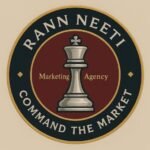In today’s digital-first world, having a great product or service isn’t enough — small businesses must also know how to market themselves effectively online. With increasing competition and limited budgets, it’s crucial to focus on strategies that offer maximum impact at minimal cost. Digital marketing provides small businesses with powerful tools to reach their target audience, build brand awareness, and drive consistent growth. Whether you’re just starting out or looking to scale, understanding the right mix of digital marketing strategies can make all the difference. From SEO and social media to content creation and analytics, the following ten strategies are tailored to help small businesses grow smart, connect deeply with customers, and compete with even the biggest brands in the market.
- In today’s competitive digital world, small businesses must adopt smart and effective marketing strategies to stand out and grow. One of the most powerful tools is Search Engine Optimization (SEO). By optimizing your website for relevant keywords, especially local ones, your business can appear higher in Google search results, attracting organic traffic without paying for ads. Creating quality content, improving website speed, and building backlinks are key to successful SEO.
- Another essential strategy is Social Media Marketing. Platforms like Instagram, Facebook, and LinkedIn allow businesses to connect directly with their audience. Sharing engaging content such as reels, stories, and carousels can help increase visibility and build a loyal community. For small businesses, this is a cost-effective way to build brand presence and drive customer interaction.
- Email Marketing is a highly personalized and high-ROI tool. Building an email list allows you to send newsletters, offers, and updates directly to interested customers. It’s great for nurturing leads and converting them into loyal buyers. Using tools like Mailchimp or Brevo, even small businesses can automate and manage email campaigns effectively.
- Content Marketing is another long-term growth strategy. By creating useful and educational content such as blogs, videos, or infographics, businesses can position themselves as experts in their field. This not only helps in SEO but also builds trust and authority among potential customers. For example, a bakery sharing cake-decorating tips or a salon offering haircare advice can attract more interest and followers.
- Google My Business (GMB) Optimization is crucial for any local business. By claiming and regularly updating your GMB profile, you increase your chances of appearing in local search results and Google Maps. Uploading photos, sharing updates, and collecting customer reviews can drive foot traffic and calls from people nearby searching for your service.
- For faster results, Paid Advertising (like Google Ads and Facebook Ads) can be very effective. It allows businesses to reach targeted audiences based on interests, location, and behavior. Even with a small budget, you can run A/B tests to find what works best, drive traffic to your site, and convert leads into customers almost instantly.
- Direct communication through WhatsApp and SMS Marketing is another smart move. These channels have high open rates and provide a personal touch. You can send order confirmations, special offers, or reminders directly to customers. WhatsApp Business is especially useful for small businesses that rely on one-to-one interaction.
- In 2025, Video Marketing is more important than ever. People prefer watching short, engaging videos over reading long posts. Whether it’s Instagram Reels, YouTube Shorts, or customer testimonials, video content helps humanize your brand and improves engagement significantly. Even simple behind-the-scenes videos can build trust with your audience.
- Collaborating with Influencers and Micro-Influencers can also boost visibility. Partnering with influencers who align with your brand, especially those with 5,000–50,000 followers, can lead to high engagement and more conversions at a lower cost. It’s especially effective for local or niche markets.
- Finally, no marketing strategy is complete without Analytics and Conversion Tracking. By using tools like Google Analytics, Meta Pixel, and UTM links, you can track where your traffic is coming from, which campaigns are working, and how users behave on your site. This data helps make informed decisions, improve ROI, and refine your marketing approach continuously.

